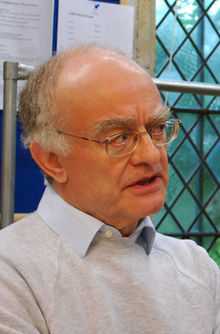Magnificat (Rutter)
| Magnificat | |
|---|---|
| by John Rutter | |
 Madonna im Gärtchen, anonymous Rhenish Master, 16th century | |
| Genre | Sacred vocal music |
| Text | Magnificat |
| Language |
|
| Performed | 26 May 1990 – Carnegie Hall, New York |
| Published | 1991 – Oxford University Press |
| Movements | 7 |
The Magnificat by John Rutter is a musical setting of the biblical canticle Magnificat, completed in 1990. The extended composition in seven movements "for soprano or mezzo-soprano solo, mixed choir, and orchestra (or chamber ensemble)"[1] is based on the text in Latin, interspersed with an English poem on Marian themes, "Of a Rose, a lovely Rose", the beginning of the Sanctus and a prayer to Mary. The music includes elements of Latin American music.
History and text
The Magnificat or Song of Mary is one of the three New Testament canticles, the others being Nunc dimittis and Benedictus. Mary sings the song on the occasion of her visit to Elizabeth, as narrated in the Gospel of Luke (Luke 1:39–56). It is a daily part in Catholic vesper services and Anglican Evening Prayer.[2]
John Rutter followed the tradition of setting it to music, especially the work by J.S. Bach which also structures the text in movements of different character. Magnificat was composed on a commission by MidAmerica Productions, a concert organisation in New York performing in Carnegie Hall with a choir of about 200 voices selected in the United States.[3] Rutter was inspired by "jubilant celebrations of Mary in Hispanic cultures"[2] and conceived the work as a "bright Latin-flavoured fiesta".[3] In addition to the liturgical Latin text, he chose a 15th-century poem, which compares Mary to a rose.[2] In the third movement, the beginning of the Sanctus is inserted after the mentioning of "sanctum nomen eius" (his holy name). The text of the doxology in the last movement is interspersed with a prayer to Mary, "Sancta Maria, succure miseris" (Holy Mary, help those in need).[4] Rutter supplied a singing version in English for the complete work.[1]
Movements

- Magnificat anima mea
- Of a Rose, a lovely Rose
- Quia fecit mihi magna
- Et misericordia
- Fecit potentiam
- Esurientes
- Gloria Patri
Scoring
Rutter scored the work for a female soloist, soprano or mezzo-soprano, who at times represents Mary, and a mixed choir, usually SATB, but sometimes with divided soprano, tenor and bass parts. He offers two versions, for orchestra or chamber ensemble. The orchestra consists of[1]
- woodwind: 2 flutes, 2 oboes, 2 clarinets, 2 bassoons
- brass: 4 horns, 3 trumpets, 3 trombones, tuba
- percussion: timpani, percussion (glockenspiel, snare drum, crash cymbals, suspended cymbal, tambourine, bongos)
- strings: harp, strings
The chamber version replaces the brass mostly by the organ and uses only one each of flute, oboe, clarinet and horn. Timpani, percussion and harp are the same as in the orchestra version, and for the strings, a minimum of two first violins, two second violins, two violas, one cello and one double bass required.[1]
Performance, recording and publishing
The first performance, conducted by the composer, was on 26 May 1990 in Carnegie Hall, with soloist Maria Alsatti and the Manhattan Chamber Orchestra.[1] Rutter also conducted a recording with soloist Patricia Forbes, the Cambridge Singers and the City of London Sinfonia.[4] A performance lasts about 40 minutes.[1] The work was published by Oxford University Press in 1991.[5] Of a Rose, a lovely Rose was also published individually in 1998.[6]
A reviewer notes that Rutter "emphasises the joy experienced by a ... soon to be mother", with "a good balance between the extrovert and intimate", and singable melodies with an understanding for the voice. He ends: "The orchestration is brilliant and very colourful, with lots of trumpet fanfares complementing the festive spirit of the music."[7]
References
- ↑ 1.0 1.1 1.2 1.3 1.4 1.5 Rutter, John (1990). Magnificat. Oxford University Press.
- ↑ 2.0 2.1 2.2 "John Rutter / Magnificat for soprano, chorus & orchestra". Allmusic. Retrieved 27 January 2014.
- ↑ 3.0 3.1 Rutter, John. "John Rutter (b. 1945) / Gloria • Magnificat • Te Deum". Naxos. Retrieved 27 January 2014.
- ↑ 4.0 4.1 "John Rutter / Requiem & Magnificat" (PDF). collegium.co.uk. Retrieved 27 January 2014.
- ↑ "John Rutter / Magnificat". Oxford University Press. Retrieved 27 January 2014.
- ↑ "Of a Rose, a lovely Rose". Oxford University Press. Retrieved 27 January 2014.
- ↑ Briggs, Bob. "John Rutter (b. 1945) / Magnificat (1990) / Brother Heinrich’s Christmas - A Fable with music (1982)". musicweb-international.com. Retrieved 27 January 2014.